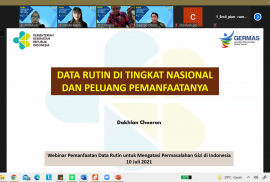On Saturday, July 10, 2021, PKGM has held a webinar with the title “Utilizing Routine Data to Overcome Nutritional Problems in Indonesia” via Zoom. This activity was enthusiastically welcomed by the participants.
The resource persons are experts and panelists in the field of public health and routine health data, including Prof. Dr. dr. Masrul, M.Sc, SpGK from Andalas University; Dakhlan Choeron, SKM, MKM from the Directorate of Community Nutrition, Ministry of Health, Republic of Indonesia; dr. Tiara Marthias, MPH, PhD from PKMK FK-KMK UGM; Dr. Siti Helmyati, DCN, M.Kes from PKGM FK-KMK UGM; and Insan Rekso Adiwibowo from PKMK Fk-KMK UGM. These resource persons are also actors who play a role in the eMonev Nutrition and MCH which will be held in 2020.
“Regular data is our precious treasure,” said Prof. Dr. dr. Masrul, MSc, SpGK in the webinar. Obviously, routine data is a source of information that can be used for analysis of the situation in each region, and can be used for the formation of appropriate policies. In addition, the central government also needs to play a role in mapping the situation in the regions.
According to Dakhlan Choeron, SKM, MKM, in determining the right nutrition intervention to address nutritional problems, we need to know who, where, and how the intervention is targeted. The information is only obtained from surveillance data or routine data, not from survey data. Routine health and nutrition data does have various issues, one of which is data validity. However, we must begin to dare to use routine data for decision-making so that there is improvement and improvement in the quality of routine data.
On the same occasion, dr. Tiara Marthias, MPH, Ph.D., Dr. Siti Helmyati, DCN, M.Kes, and Insan Rekso Adiwibowo, MSc explained the experience of conducting eMonev Nutrition and MCH (Maternal and Child Health) in 2020. This activity utilizes Komdat data for MCH and ePPGBM for Nutrition in conducting an analysis of the situation in various regions in the nutrition and MCH program before and during the COVID-19 pandemic. MCH and Nutrition dashboards were also featured in the webinar. The dashboard serves to show the results of the situation analysis that has been carried out by the district/city health office during eMonev and provides a visualization so that all parties, including the layman in health matters, can know the results of the eMonev carried out.
“There are many things that can be reflected from last year’s eMonev activities,” said dr. Tiara Marthias, MPh, Ph.D. Through this reflection, we are expected to be able to implement better and optimal use of routine health and nutrition data and can start using routine data for health and nutrition planning and policy management.
Arsip 2021:

